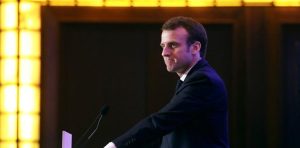
Howard Fineman, a witty, encyclopedic political reporter who dominated the fast-evolving world of Washington journalism for nearly 40 years, moving effortlessly from daily news coverage to the pages of Newsweek magazine to cable news punditry and later to the frontiers of online journalism, died on Tuesday at his home in Washington. He was 75.
The cause was pancreatic cancer, his son, Nick, said.
After beginning his career at The Louisville Courier-Journal in Kentucky in the early 1970s, Mr. Fineman arrived in Washington in the late ’70s, writing first for The Courier-Journal and then for Newsweek, where he spent nearly 30 years as a reporter and editor.
He was part of what might be called the post-post-Watergate generation of journalists. No longer directly fired by the scrappy, crusading spirit of the young Bob Woodward and Carl Bernstein, Mr. Fineman and his cohort brought a polished professionalism to their task matched with a dogged ambition that fit the Ronald Reagan era in Washington.
It was a more collegial time, both between political parties and between them and the news media. Mr. Fineman soon gained renown as one of the fastest and most productive reporters, able to work sources for the sort of slow, steady drip of scoops that define success among Washington journalists.
His work helped Newsweek stand out at a time that many people consider a golden age for newsmagazines. Alongside colleagues like Gloria Borger, Michael Isikoff and Evan Thomas, Mr. Fineman created a weekly report that blended breaking news with measured analysis and context, setting the tone for how people in Washington and the nation discussed them.
“He believed in the story, always attuned to where the political conversation was headed,” the historian Jon Meacham, who worked with Mr. Fineman at Newsweek, said in an email. “Howard was what was known as a master ‘violinist,’ the lead voice of the magazine responsible for writing the piece that served as the overture to everything that followed.”
Mr. Fineman prided himself on being an early adopter of anything that might help him pursue the news. He was, he said, among the very first Washington reporters to own a laptop computer: the TRS-80 Model 100, which had enough storage for about 10 pages of text, along with a modem to connect him to his Newsweek editors.
He was one of the first Washington journalists to recognize the impact that cable news would have on their industry, just as the medium was taking off in the early 1980s. CNN and later Fox and MSNBC were eager for clever, telegenic, informed pundits to fill talk-show seats, and Mr. Fineman was all three.
He was a regular on shows like “Hardball with Chris Matthews” on CNBC and MSNBC and “Washington Week” on PBS; later, he was a common sight on satirical news programs like “The Daily Show” and “The Colbert Report.”
“He was a pioneer in making the transition between a time when print was the most powerful force to a time when TV took over,” E.J. Dionne, at the time a reporter for The New York Times and now a columnist for The Washington Post, said in an interview.
Mr. Fineman estimated that in the late 1990s he made some 200 TV appearances related to President Bill Clinton and the Monica Lewinsky scandal alone. So ingrained was he in the talk-show ecosystem that he achieved that most elusive of Washington accolades, as the butt of a well-worn joke: “If Howard Fineman’s here, who’s on TV?”
Politicians could be equally abrasive. After Mr. Fineman declared in 1999 that George W. Bush had all but captured the Republican presidential nomination over his closest rival, Senator John S. McCain of Arizona, the senator called Mr. Fineman a “gasbag” who had no understanding of the warp and weft of America outside Washington.
Mr. Fineman was unshaken. He called Mr. McCain immediately to patch things up, telling the senator that he was right about Beltway insularity — but also that he was no fan of the East Coast bubble either, and that he had already traveled thousands of miles covering the nascent campaign season.
As a conciliatory gesture, Mr. McCain sent Mr. Fineman a pair of red boxing gloves.
Indeed, Mr. Fineman remained proud of his professional roots in Kentucky, where he had learned to cover politics and policy, as well as to write quickly on deadline. He covered energy and the environment for four years at The Courier-Journal, including the infamous toxic landfill discovered at Love Canal, near Niagara Falls, N.Y., in 1977.
“That was as good a place as any to get a grounding in what the next half century of American politics was going to be about,” he said in an interview for this obituary last year. “The rise of Reagan, the rise of the conservatives, and what we now think of as the anti-woke movement, if you will, all of that has its weight in the South.”
The Courier-Journal sent him to Washington in December 1977. After jumping to Newsweek in 1980 (and getting a law degree in his off hours), he served as political correspondent, chief political correspondent, senior editor and deputy Washington bureau chief.
By the 2000s he was a reliable fixture of what had become the old-school Washington journalistic establishment, centered on print and cable news. Many were surprised when, in 2010, he left Newsweek for The Huffington Post, which was just beginning to build its news operation. Once again, he had sensed an epochal shift underway in political journalism, as digital media unraveled the rhythms and mores imposed by the printed page.
“It really wasn’t a difficult decision at all once I really began to think about it, because this is where the action is,” he told The New York Times in 2010. “The chance to dive headlong into the future is one that I don’t think anyone could pass up.”
In 2009, just before leaving Newsweek, Mr. Fineman published a book, “The Thirteen American Arguments: Enduring Debates That Define and Inspire Our Country.” The book offered a sweeping tour through some of the country’s longstanding cleavages, but it also served as a sort of road map to Mr. Fineman’s perspective on his career’s abiding subject.
“Democracy is rough and nasty,” he told the newspaper The Jewish Weekly in 2009. “We were the first country founded on the idea that nobody has the ultimate answer in public life. In order to figure out what we have to do, we have to discuss it, we have to argue it. The country was born in a debate about our society.”
Howard David Fineman was born on Nov. 19, 1948, in Pittsburgh. His father, Charles, worked for the Dexter Shoe Co., and his mother, Jean (Lederman) Fineman, was an English teacher.
He married Amy Nathan, a tech lawyer, in 1981. In addition to his son, Nick, a senior producer at MSNBC, Mr. Fineman is survived by his wife; their daughter, Meredith Fineman, an author and speaker; and his sister, Beth Fineman Schroeter.
Mr. Fineman liked to joke that his disputatious father had prepared him for his career in journalism and, especially, in TV punditry.
“There’s a direct line from my table to ‘Hardball,’” he told The Jewish Weekly. “My dad was like Chris Matthews because he would both ask and answer his own questions.”
He studied English at Colgate University, where he edited the school newspaper, and graduated in 1970. A travel scholarship allowed him to venture across Eastern Europe and the Middle East, pursuing his family’s Jewish roots.
After he returned, he received a master’s degree in journalism from Columbia, in 1973. He received his law degree from the University of Louisville in 1980.
Mr. Fineman left The Huffington Post in 2018. He became a political analyst for NBC and MSNBC and taught a class at the University of Pennsylvania’s Annenberg School of Communication called “New Media Journalism and Politics in the Trump Era.”
He also grew more skeptical of the vision for America that he laid out in his 2013 book. Having gone through the last decade of polarization and partisan vitriol, it was, he said in 2024, “naïve” to think that a common sense of political good will was still a given, or that freewheeling debate would produce progress.
And he worried that the desire for fame and fortune had gutted the political journalism corps, just as technological and social change were tearing apart the traditional news media. But, he added, only a re-energized news industry can reverse the country’s downward course.
“We are in what I view as a new global world war for control of the search for truth,” he said. “We have to mobilize our truth-seeking strength to survive, for America and democracy to survive.”
Alex Traub contributed reporting.





